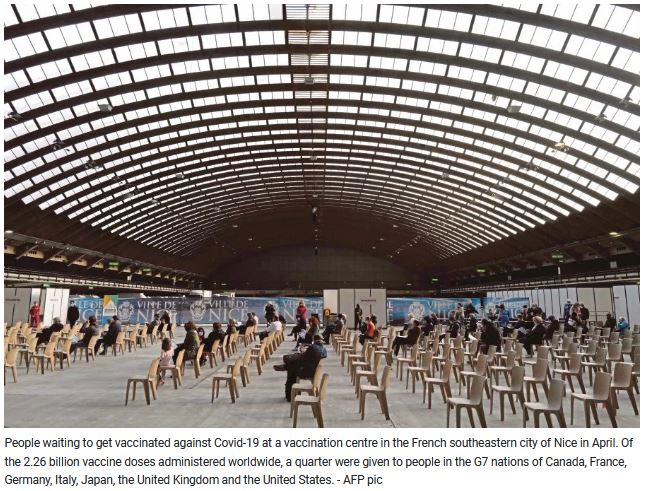Hypocrisy and vaccine apartheid
Emeritus Professor Tan Sri Dato' Dzulkifli Abdul Razak
Opinion - New Straits Times
June 14, 2021
"A world vaccinated" following the pledges made at the G7 Summit is no more than a euphemism for "a world divided". Or even harsher.
It is virtually an afterthought despite the many earlier pledges that the world must remain united in the face of the pandemic onslaught. Especially before vaccines were hurriedly produced as the most unlikely places in the global north suffered the worst for the longest time.
Almost miraculously, a variety of vaccines were "manufactured" and "approved" for "emergency" use. It spurred a "vaccine race" among Big Pharma to dominate the global community that is desperately seeking herd immunity as the ultimate protection.
The "race" very quickly morphed into "vaccine nationalism", where rich nations started to jostle among themselves for more vaccines than they needed.
The pledge for a unified world began to turn ugly, to the extent that there were moves to ban vaccine export, as well as legal threats against companies for allegedly failing to deliver.
To be sure, it gave rise to vaccine inequality, where some countries unashamedly hoarded more vaccines than necessary. Never mind the global south that had yet to administer even a single dose then compared with the global north.
This led the United Nations secretary-general to sound a stern warning on the looming disparities as the pandemic rages on.
The disparities were stark ahead of the G7 Summit, with member countries reportedly holding 85 per cent of vaccines, with less than one per cent for the developing world, including Africa.
As the summit deliberated, figures showed that of the 2.26 billion vaccine doses administered worldwide, a quarter (560,271,029 doses) were given to people in the G7 nations of Canada, France, Germany, Italy, Japan, the United Kingdom and the United States.
Some likened this to "vaccine apartheid" as it made utter nonsense of the notion that no one is safe until all are safe! Or herd immunity within the global context. More strikingly, the total number of vaccine doses administered in G7 countries is 381 times more than in the 50 countries with the lowest total vaccinations combined. This hypocrisy cannot be more obvious when the summit announced its concern by "donating" to developing countries one billion doses of vaccines with no strings attached. In some cases, they come from the "surplus" (yes, surplus) of their hoarded stock.
Despite the "noble" intent, this is clearly far from the estimated 11 billion doses needed, according to UK-based charity Oxfam, which dubbed the summit a "failure".
In short, "vaccine apartheid" is very much alive, thanks to the myopic G7 leadership. That is, before the coronavirus and its ever evolving (often more lethal) variants overwhelmed the situation, since not everyone (including large pockets in developed economies) is protected as stated by conventional wisdom.
In summary, the strategy to act collectively and collaboratively failed to ensure that the poorest among us get access to vaccines.
Perhaps this is for the better as long as the uneven distribution and administering of vaccines are not rectified due to sheer lack of willingness, honesty and humanity — where all lives matter.
A case in point is that G7 countries have more coronavirus vaccines than more than 80 other nations combined.
Compounding this is the unwillingness to even temporarily suspend patents so that vaccines can be made faster by spreading production across the world.
Big Pharma, true to its colours, seems to be the biggest barrier, as it has always been throughout history. This is not surprising as some brand names involved in the "vaccine race" have been tainted with similar scandals before.
As a result, the global vaccine rollout and expected impact has been anything but equal. The rest is history, though largely unseen by the public at large!
It leaves one wondering if we will ever learn from mistakes of the past, to quote British Prime Minister Boris Johnson when he spoke at the summit.
The writer, an NST columnist for more than 20 years, is International Islamic University Malaysia rector

